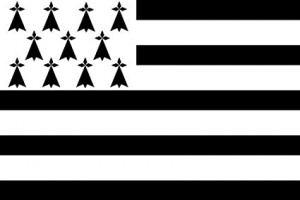Language/Breton/Vocabulary/Express-Surprise
Hi Breton learners! 😊
In this lesson, we will learn how to express surprise in Breton. Surprise is an emotion that we all experience, often in different circumstances. It can be a pleasant surprise or an unpleasant one. In any case, it can be a useful emotion to express in different situations. So, let's get started!
Once you've mastered this lesson, take a look at these related pages: Usual expressions and words in Breton & Geometry.
Basic Vocabulary[edit | edit source]
To express surprise in Breton, you can use the following expressions:
| Breton | Pronunciation | English |
|---|---|---|
| Gas ! | Gas ! | Wow! |
| Displijus ! | Dis-pli-yous ! | Amazing! |
| Ketenus ! | Ke-tenus ! | Staggering! |
| Hoc'h eus surpris me ! | Hoch-eus sur-pri me ! | You surprised me! |
Useful Phrases[edit | edit source]
You can use these phrases to express surprise in different situations:
Surprise at a pleasant event[edit | edit source]
- Waouh ! Ar baotred eo brav ! (Wow! The show is amazing!)
- Benoît a ra brav zoal bep bremañ ! (Benoît is doing an amazing job every time!)
- Ra vefe brav an amzer ? Ya ! (Would the weather be great? Yes!)
Surprise at an unpleasant event[edit | edit source]
- O nijal zo kalet eo ! (The exam is unexpectedly difficult!)
- Ateb a-hed ar c'houlzioù eo war an dachenn eo eo deuet al labour war-raok. (The work has come forward faster than expected.)
- Ar vugale a zo o c'hoari dianav ! (The children are playing too noisily!)
Feeling surprised[edit | edit source]
- Bepred c'hoazh em eus surpris. (I'm still surprised.)
- A zo deuet afer dezhañ dre man ? Ur c'hroc'hennoù ! Surpris a ra ! (Did he receive something by mail? It's a dress! He's surprised.)
- Divyezhek eo bev a-wechoù ar sakridigezh. (The secrets of religion are sometimes surprising.)
Dialogue[edit | edit source]
Person 1: Gas ! (Wow!) Person 2: Ihan zo o haldiñ ouzh ar sklêrijenn-se bras (Ihan is admiring this landscape.) Person 1: Ketenus ! (Staggering!) O tont a-benn ! ( You're right!) Person 2: Ya, prantad dehou a zo provet ouzhpenn. (Yes, this southern region is even more beautiful.) Person 1: Displijus ! (Amazing!) Person 2: Ne'z eus nemet klask an dud o vont o doa dreist dit. Me ne ouzer ket penaos ma vo evit al leurenn. (People just wanted to come, they were beyond you. I don't know how it will be for the concert.)
Culture Info[edit | edit source]
Breton language is part of the Celtic family of languages, the same family as Irish, Scottish Gaelic and Welsh. It is spoken in Brittany, a region of France that was once an independent Celtic nation. Today, Brittany is divided into four administrative departments - Finistère to the west, Côtes-d'Armor to the north-east, Morbihan to the south-east and Ille-et-Vilaine to the east. Breton is the main language of the region, but it is also spoken in other parts of France and in other countries by Breton emigrants.
Fun Facts[edit | edit source]
- Breton has been spoken for over 1500 years, making it one of the oldest languages in Europe.
- In Breton, the word "hello" is "demat", and it is pronounced "deh-math".
- The most popular Breton songs are about sea shanties, country dances, and sailor legends.
To improve your Breton Vocabulary, you can also use the Polyglot Club website. Find native speakers and ask them any questions!
Sources[edit | edit source]
- Breton Vocabulary - Express Surprise
- UVA Innovator of the Year Marc Breton's Surprise Journey to ...
Other Lessons[edit | edit source]

